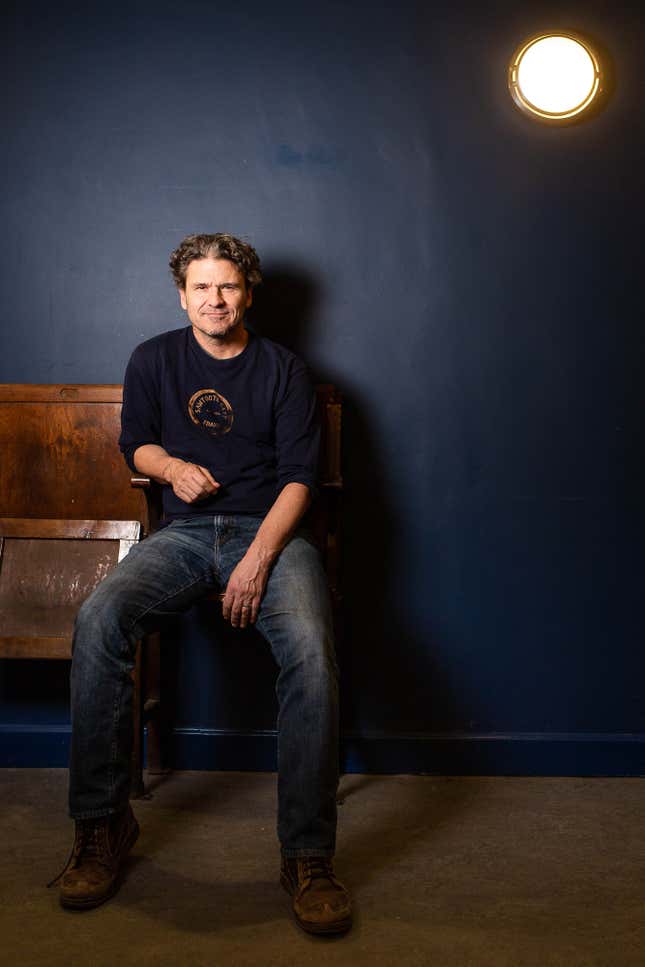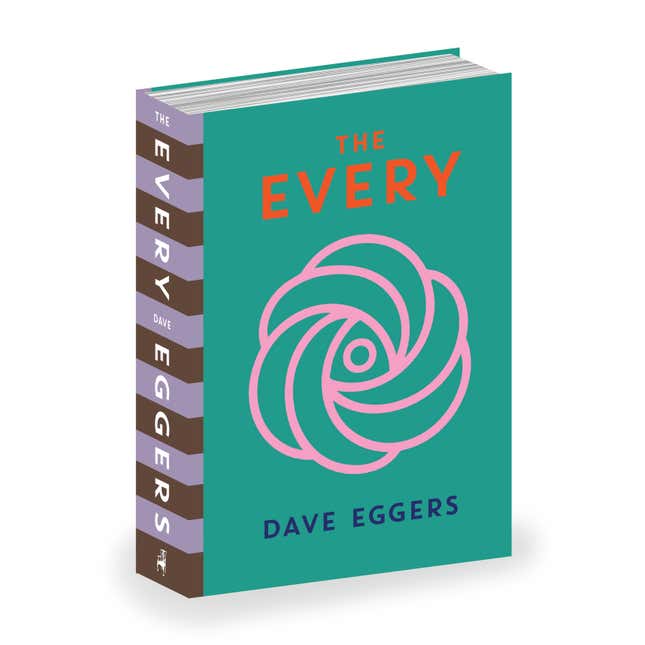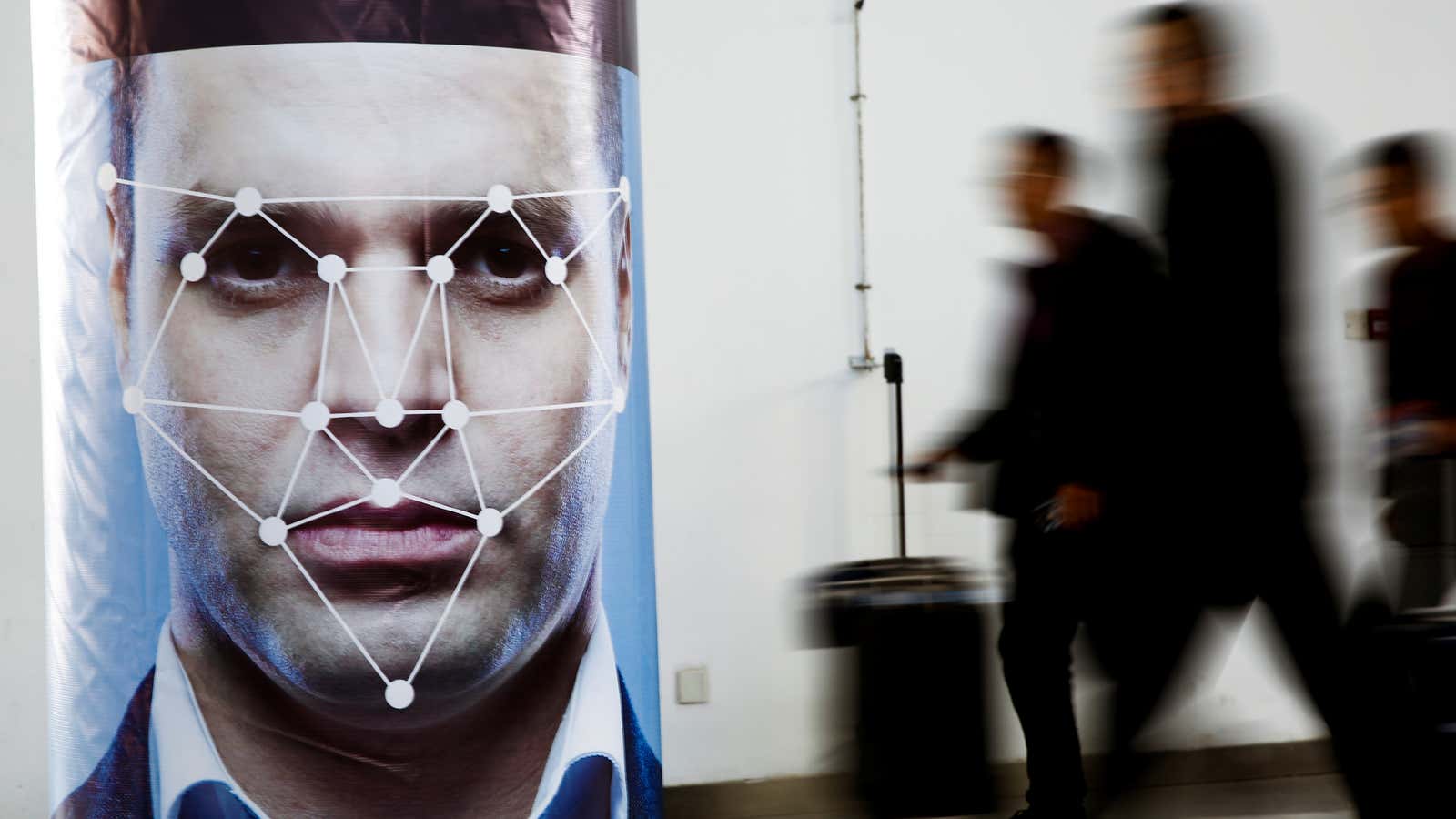A smart speaker that eavesdrops on your conversations—and alerts the police if it picks up verbal cues that suggest domestic abuse. An app that keeps track of how much sleep and exercise you’ve gotten that day—as well as how often you’ve laughed and how many new words you’ve used, sending relentless reminders to keep you on track. In Dave Eggers’ The Every, a follow-up to his 2013 novel The Circle, the tech dystopia that characters navigate bears a strong resemblance to our current reality, dialed up a notch or two.
Eggers’ latest book imagines a world where Facebook (“the Circle”) and Amazon (here known as “the jungle”) have merged to become the Every, creating a monopoly so powerful and far-reaching that even circumspect citizens have concluded that resistance is futile. Among the last holdouts is Delancey Wells, a former forest ranger who maneuvers her way into a job at the Every with the hope of tanking it from the inside. Her plan: To seed ever-worse ideas, one of which will surely cross a line, inspiring protests and regulatory crackdowns. Unfortunately for Delaney, she can’t seem to stop churning out hits, from a lie-detector app to use on your friends to a filter that “fixes” classic novels by making characters more likable and cutting outdated or problematic passages.
The novel’s perspective on Big Tech may strike some people as excessively dire, but it comes from a place of genuine concern: Eggers is careful to limit the intrusion of technology into his own life, noting that he uses a flip phone and only installed WiFi in his home last year, so that his son could attend school online during the pandemic. And it’s also worth reading the book precisely because it lays out the worst-case scenario of technology that caters to the public’s growing taste for self-optimization, convenience, and a life without guilt. (Not beating around the bush, one of the book’s subtitles is “The Final Days of Free Will.”)
Quartz spoke with Eggers recently about his thoughts on “Instagram for kids,” why he thinks every individual’s carbon footprint will soon be held up for public scrutiny, and whether it’s possible to work for change from the inside of a tech behemoth.
This interview has been edited and condensed for clarity.
The psychology of the quantified self
Quartz: One of the things that stuck out to me was your critique of the way that people have this insatiable desire for self-optimization and self-quantification. Your insight is that it’s connected to our desire to know whether we’re good, and we’re turning to technology to answer that question. I wonder if that insight comes from something that you’ve experienced in your own life; have you ever fallen prey to the lure of the Fitbit or other technologies?
Dave Eggers: No, not myself. I mean, I’m talking to you on a flip phone. So that tells you what part of the spectrum I’m on … But I remember a friend of mine who was extolling the virtues of a meditation optimization device. You put it around your forehead like a tiara, and it tells you if you’re meditating correctly. There’s just no chance it has any scientific value. But this very enlightened, smart friend of mine had bought it and swore by it.
I think this is a unique moment in history where we want certainty, we don’t trust our judgment very often, and we need a third party to tell us if we’re doing something right. We’ve become data addicts, and we don’t feel like we can move through the world unmeasured.

Your book has multiple references in passing to “the pandemics” and how they changed various aspects of society for people. Were you writing The Every while Covid happening, or was that a coincidence?
I think I was finishing it, so deep into draft four or something like that. And you know, the experts that I read said that this is not our last pandemic.
We were all stuck inside and travel had ceased, but I had already written that chapter about how we could no longer justify travel [for environmental reasons]. I didn’t know if that needed to change, because we would all be wanting to get back to travel afterward. But I left it as is. The idea of “flight shame” is more prominently expressed in Europe. I think that there’s increasing judgment about who travels where and why and how much, and pretty soon we will know the individual carbon impact of everybody around us, and be able to properly shame them if we decide that their carbon impact is higher than it should be. And that will be the inevitable intersection of surveillance and the datafication of our lives and the use of public shame as a moral tool.
I was intrigued by the way you wrote about the environmental cost of travel—that and a lot of the causes the Every is backing in the book are what we traditionally think of as liberal causes, everything from fighting climate change to reducing sexual harassment. But that winds up being taken to extremes in the authoritarian way it’s enforced. I wonder, were you trying to help liberals see some of themselves in the book, too?
I consider myself a San Francisco liberal, but I’m always alarmed when a private corporation or entity uses surveillance or shame to call out individual behaviors. A monopolistic power used to bend the population to its will or to its sense of what’s right or wrong—that can go wrong very quickly. I don’t think that an e-commerce site should be deciding what’s moral.
Often what you see in some of the most insidious innovations of the last four years is they are sometimes dressed up with their perceived societal benefits. Facebook has a new Instagram for kids, right. They say, well, we’re going to introduce this new Instagram for tweens or younger kids, because they’re going to use it anyway. And this way you can have filters embedded in it that make it safer. It’s like marketing candy cigarettes to children; “we might as well give them candy ones so that they ease into tobacco-filled ones later.” It’s just a diabolical way of reasoning.
Working for change from within
There’s a conversation toward the end of the book where one character is talking about how working from inside the Every is the best chance he has of turning around climate change, because the company is so much more powerful than any single country or government. I found myself thinking he might be right; maybe change is most possible when you’re working from the inside. What are your thoughts?
I actually am a little agnostic on that subject. I don’t know of anyone in any major company who internally has pushed them back or pulled them back from the brink of doing something terrible.
Right, and we also wouldn’t know because it wouldn’t get publicized.
So maybe there are some heroes at all of these companies that are saving them from doing far worse than they’ve already done. I have friends at every one of these companies, who are incredibly smart and idealistic, sometimes aware of the damage being done and sometimes frustrated by it and very often just kind of separating themselves from the larger damage, and concentrating on their little corner of the company where they think they’re doing good.

Do you think that if someone really cares about fighting climate change, their best option is to go and work for Amazon and try to turn them around? Or is there a better way?
I hear both sides a lot. I even heard from an oil company executive the other day who’s an environmentalist who said, “I’m better off here and the world is better with me being here than not being here.” I want to hope that there are all kinds of people in all of these companies that are actually ethical and are, you know, blunting or killing some of the worst ideas.
But at the same time, years ago on one of my college visits, I met a young engineering student who was really thoughtful. His goal was to work at one of the Big Five. And he said, “The only way I’m going to get hired is if I have ideas about going further. I’m not going to be hired by saying, ‘Slow down, let’s have fewer users. Let’s have them engaged for less of the day. Let’s tell them to log off and enjoy hiking trails without us.’”
I don’t think there are too many incentives to be the one that blows the whistle or says slow down. There’s all kinds of roadkill out there, people that were in ethical positions at this or that company and couldn’t get heard and quit.
The joy of writing without WiFi (ideally on a boat)
I remember reading when Gary Shteyngart was writing Super Sad True Love Story, he had to keep changing the book because the stuff that he was making up kept actually happening. Did that happen to you in the process of writing this book?
That happened with 100% percent of The Circle, and maybe 50 times with this. Sometimes it was not knowing that the thing already exists. I would think, it’s the silliest thing I could possibly conjure, but it had already been invented and in some cases, already come and gone.
One thing I really enjoyed was going for pure comic value in some cases, like an app that will tell you if you enjoyed the food that you just ate. I think that with the advent of measurements for all these unmeasurable things, it’s changing our memories and our attitudes. If we see a ballet that we love and then we see it measured and it’s got a 74/100, then we say, I guess it wasn’t good. And we go back to alter our memories to fit.
This is something that I struggle with Will Ferrell movies, because I think they’re so funny, but the critics don’t love them. So Eurovision gets a 36 on Rotten Tomatoes, and I’m like, Oh, but I thought it was great. [Editor’s note: The movie actually has a 63% fresh rating on Rotten Tomatoes, but it deserves to be much higher.]
And the more these companies own movie studios, they’re going to be and have been applying algorithms and all the data-centric ways of creating. Why did that Will Ferrell movie get a 36, how do we get it up to a 68? Well, we need fewer llamas, we need more weddings, we need more Rachel McAdams. There will be a science to it, because the powers that be have been trying to apply science to filmmaking for so long. And where there’s profit potential, they will try anything. There’ll be less and less room for ambiguity, less room to be affected by human fallibility.
It’s a depressing thought. I do want to leave some time to talk about your writing as well, as long as algorithms don’t determine what gets made yet. What’s your writing routine like?
I used to write exclusively from about 10pm to 4 in the morning, because I wanted to be awake when nobody else was and not have to answer the phone. But then you have kids and you can’t do that. So my hours for the last 15 years really have been 9 to 5. I converted my garage to the filthiest, ugliest office anyone has ever seen.
But then, actually when Covid hit and we had to do online schooling, we got internet in the house for the first time—we’d never had WiFi before. Now it’s hard to work here, so I actually work on a boat in San Francisco Bay. I go to the boat every day now, a tiny little boat that I work in the hull of.
Sounds lovely.
I wish I’d thought of it 20 years ago. There’s herons and seals and egrets and sea lions. They come and go, the boat’s gently rocking all day. I can’t recommend it enough.
